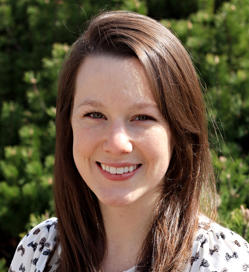
Julia Gamache
Thesis Title:
Confounding variables in transgenic mouse models of tauopathy.
Current Position:
Senior Medical Affairs Specialist at Medtronic
Undergraduate Institution and Major:
Carleton College 2014
Graduate Advisor:
Karen Ashe, M.D., Ph.D., Departments of Neurology and Neuroscience
Michael Koob, Ph.D., Department of Laboratory Medicine and Pathology
Description Of Graduate Research:
The goal of my research is broadly to determine the role of the protein tau in the pathogenesis of neurodegenerative diseases called tauopathies. I am using novel genetically matched transgenic mouse lines to determine the distinguishing molecular phenotypes associated with the pathogenic P301L tau mutation linked to frontotemporal dementia.
Graduate Level Publications:
- Gamache JE, Kemper L, Steuer E, Leinonen-Wright K, Choquette JM, Hlynialuk C, Benzow K, Vossel KA, Xia W, Koob MD, Ashe KH. Developmental pathogenicity of 4-repeat human tau is lost with the P301L mutation in genetically matched tau-transgenic mice. J Neurosci. 2020 Jan 2;40(1):220-236.
- Gamache JE, Benzow K, Forster C, Kemper L, Hlyniakluk C, Furrow E, Ashe KH, Koob MD. Factors other than hTau overexpression that contribute to tauopathy-like phenotype in rTg4510 mice. Nat Commun. 2019;10:2479.
Graduate Level Abstracts:
- Gamache JE, Benzow K, Kemper L, Leinonen K, Steuer E, Hlynialuk C, Xia W, Koob M, Ashe KH. Developmental impact of Exon 10-positive tau is lost with the P301L mutation (November 3-7, 2018). Society for Neuroscience Annual Meeting, San Diego, CA.
- Gamache JE, Benzow K, Kemper L, Leinonen K, Steuer E, Hlynialuk C, Xia W, Koob M, Ashe KH. Abnormal tau dynamics in precision engineered mouse models of tauopathy (January 24, 2018). 2018 Institute for Translational Neuroscience Research Retreat, University of MN.
- Gamache JE, Furrow, E, Ashe, KH, Koob, M. Tau transgene disrupts FGF14 in the rTg4510 mouse model of tauopathy. Institute for Translational Neuroscience Research Retreat, Minneapolis, MN, 2017.
- Gamache JE, Benzow K, Furrow E, Ashe KH, Koob M. Fgf14 dysregulation by the tau transgene array causes gross forebrain atrophy in the rTg4510 mouse model of tauopathy (November 11-15, 2017). Society for Neuroscience Annual Meeting, Washington, DC
- Gamache JE, Furrow E, Ashe, KH, Koob M. Tau transgene disrupts FGF14 in the rTg4510 mouse model of tauopathy. Wallin Neuroscience Discovery Day, Minneapolis, MN, 2017.
- Gamache JE, Ashe KH, Koob M. Disease-related MAPT mutations alter steady-state levels of tau protein Alzheimer’s Drug Discovery Foundation 17th International Conference, Jersey City, NJ, 2016.
- Gamache JE, Ashe, KH, Koob, M. Disease-related MAPT mutations alter steady-state levels of tau protein. Society for Neuroscience Annual Meeting, San Diego, CA, 2016.
Professional Presentations:
- Disease-related MAPT mutations alter steady-state Tau levels. N. Bud Grossman Center for Memory Research and Care, Scientist Meeting. University of Minnesota, Minneapolis, MN, 2016.
- Using precision-engineered mouse models for the study of tauopathy. N. Bud Grossman Center for Memory Research and Care, Scientist Meeting..University of Minnesota, Minneapolis, MN, 2017.
- Using precision-engineered mouse models for the study of tauopathy. Graduate Program in Neuroscience Colloquium Series. University of Minnesota, Minneapolis, MN, 2017.
Graduate Level Awards And Honors:
- Stark Award for Advanced Scholarship, UMN Graduate Program in Neuroscience May 2018 • Supports students in the Graduate Program in Neuroscience for research training in a formal course
- Scholarship to attend Cold Spring Harbor course, National Institute of Mental Health May 2018
- Sping and Ying Ngoh Lin Award, UMN Graduate Program in Neuroscience October 2017 • Acknowledges exceptional scholarly activity during graduate studies
- Ruth L. Kirschstein National Research Service Award (F31), National Institute of Health August 2017 • Received 3 years of funding for graduate thesis project to investigate the role of genetic variation in the tau gene, MAPT, in the pathogenesis of tauopathies
- Alzheimer’s Drug Discovery Young Investigator Scholar, Alzheimer’s Drug Discovery Foundation ADDF 17th International Conference, Jersey City, NJ, September 2016 • Awarded one of ten positions as a young investigator in Alzheimer’s research to attend and present a poster at the 17th international conference
- 3M Science and Technology Fellow, Graduate Program in Neuroscience University of Minnesota, June 2014 – present • Awarded 3M funding by graduate program to provide full support for the first year of graduate school and partial support for the following three years
GPN Committees:
- Career Facilitation Committee, Representative, 2015-Present
- Program Evaluation Committee, Representative, 2016-Present
- Outreach Committee, Officer, 2016-Present
Professional Societies:
Society for Neuroscience
Professional Outreach:
- Minnesota Science Museum, Social Science, St. Paul, MN; Undead Rising Event, Brain Booth, September 2015.
Thesis Committee Members:
- Harry Orr, Ph.D., Department of Laboratory Medicine and Pathology (Chair)
- Karen Ashe, M.D., Ph.D. Departments of Neurology and Neuroscience
- Michael Koob, Ph.D., Department of Laboratory Medicine and Pathology
- Marija Cvetanovic, Ph.D., Department of Neuroscience
- David Largaespada, Ph.D. Department of Genetics, Cell Biology and Development
Research Categories:
- Neurodegenerative Diseases & Neural Injury
Rotations:
- Catherine Kotz, Ph.D., Department of Food Science and Nutrition
- Karen Ashe, M.D., Ph.D., Departments of Neurology and Neuroscience
- Eric Newman, Ph.D., Department of Neuroscience
- Yasushi Nakagawa, M.D., Ph.D., Department of Neuroscience
Why Did You Choose MN?
I decided the program at the U of MN was the best fit for me because I felt that it would provide me with a stronger knowledge base and more rigorous training experience than the other programs I looked at. Additionally, there were a number of faculty with whom I was interested in working.
What Advice Would You Give A First Year Graduate Student?
Unless you already know what facet of neuroscience you’re passionate about, use the rotations to explore as many different areas or techniques as you can. You might stumble upon something you didn’t realize you’re excited about.
